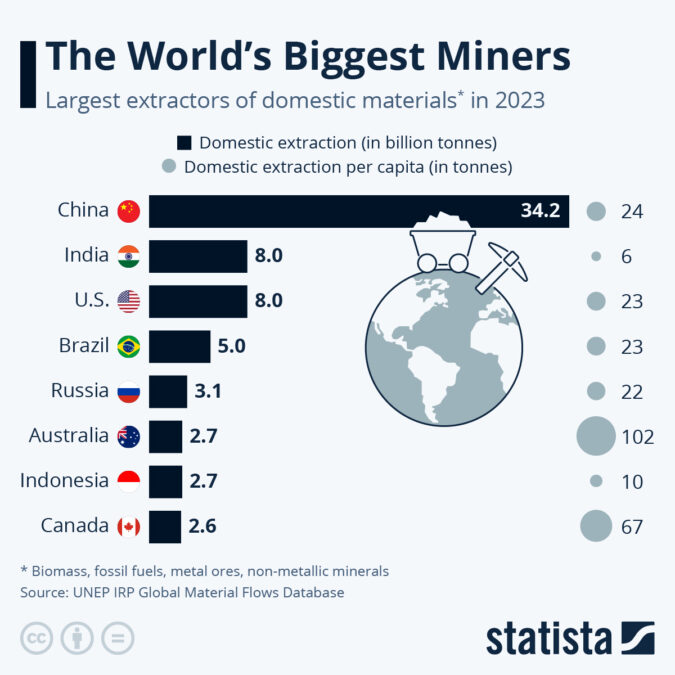These Are The World’s Biggest Mining Nations
China was the world’s biggest extractor of domestic materials in 2023, according to the UNEP’s Global Material Flows Database. The country extracted a total of 34.2 billion tonnes of materials, including biomass, fossil fuels, metal ores, and non-metallic minerals. This is more than four times the amount of either of the next two largest extractors: India (8.03 billion tonnes) and the United States (7.98 billion tonnes). India overtook the United States for the first time to become the second largest extractor of these materials in 2023.
As Statista’s Anna Fleck shows in the chart below, when looking at the domestic extraction of materials per capita, then a very different picture emerges: Australia rises to the top, with 102 tonnes of materials extracted per capita followed by Canada with 67 tonnes per capita, and only then by China at 24 tonnes per capita in 2023.
You will find more infographics at Statista
In terms of the relative shares of materials extracted per country, China’s mix is predominantly made up of non-metallic materials (70 percent of the total). These include sand, gravel and clay for construction and industrial purposes. Meanwhile, Australia’s biggest industry of the four categories is metal ores, accounting for around 53 percent of the country’s total. This includes iron, aluminum, copper and other non-ferrous metals.
Worldwide, a total of 104.1 billion tonnes of biomass, fossil fuels, metal ores, and non-metallic minerals were extracted in 2023. This is up from 96.5 billion in 2020. Asia and the Pacific accounted for the largest share with 56.9 billion tonnes of these materials extracted (or around 55 percent of the world total), followed by Latin America and the Caribbean with 11.2 billion tonnes (11 percent), North America with 10.6 billion tonnes (10 percent), Europe with 9.2 billion tonnes (9 percent), Africa with 8.2 billion tonnes (8 percent), West Asia with 5.3 billion tonnes (5 percent) and Eastern Europe and Central Asia with 2.9 billion tonnes (3 percent).
Tyler Durden
Sat, 06/08/2024 – 19:15

